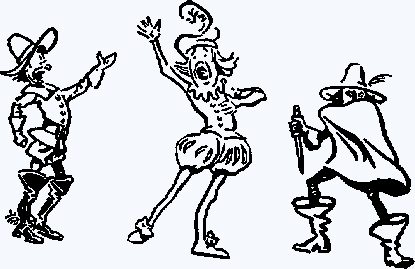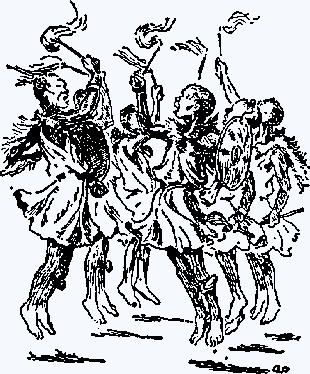Games
Scout Meets Scout
Single Scouts, or pairs of Scouts or complete Patrols, are taken out about two miles apart. They are then made to move towards each other, either alongside a road, or by giving each side a landmark to move towards, such as a steep hill or big tree, which is directly behind the other party and will thus ensure their coming together. The Patrol which first sees the other wins. This is signified by the Patrol Leader holding up his Patrol nag for the umpire to see, and sounding his whistle. A Patrol need not keep together, but that Patrol wins which first holds up its flag; so it is well for the Scouts to keep in touch with their Patrol Leaders by signal, voice, or message.
Scouts may employ any ruse they like, such as climbing into trees, hiding in carts, etc., but they must not dress up in disguise unless specially permitted.
This game may also be practised at night.
Debates
A good exercise for a winter's evening in the meeting room is to hold a debate on any subject of topical interest, with the Scoutmaster acting as chairman. He will see that there is a Speaker prepared beforehand to introduce and support one view of the subject, and another Speaker prepared to expound another view. After hearing them, he will call on the others present in turn to express their views. In the end he takes the votes for and against the motion.
At first boys will be very shy of speaking unless the subject selected by the Scoutmaster is one which really interests them and takes | them out of themselves.
After a debate or two they get greater confidence, and are able to express themselves coherently. They also pick up the proper procedure for public meetings, such as seconding a motion, moving amendments, obeying the chairman's ruling, voting, according votes of thanks to the chair, etc.
Mock Trial
In place of a debate a mock trial may be of interest as a change.
For instance, the story of the Eisdon Murder given in Yarn No. 2 might form the subject of a trial.
The Scoutmaster acts as judge, and details boys to the following parts:
Prisoner ... William Winter.
Witness ...Boy, Robert Hindmarsh.
" ...Police Constable.
" ...Villager.
" ...Old woman (friend of the murdered woman).
Counsel for Prisoner.
" ...Prosecution.
Foreman and Jury (if there are enough Scouts).
Follow as nearly as possible the procedure of a court of law. Let each make up his own evidence, speeches, or cross-examination according to his own notions and imagination, along the lines of the story, but in greater detail. Do not necessarily and the prisoner guilty unless the prosecution proves its case to the Jury.
In summing up, the Scoutmaster may bring out the fact that the boy, Hindmarsh, carried out each part of the duty of a Scout, in order to bring home the lesson, to the boys.
Unprepared Plays
The plot of a short, simple play is given, and each player is assigned his part, with an outline of what he has to do and say. The Scouts act it, making up the required conversation as they go along.
This develops the power of imagination and expression.

Play acting is good fun. It doesn't matter what kind of voice you have so long as you get out your words clearly and distinctly.
Scout Songs
The Scout's Chorus. This is a chant t hat the African Zulus used to sing to their Chief. It may be shouted on the march, or used as applause at games and meetings and camp fires. It must be sung exactly in time.

![]()
Leader: Eengonyama-gonyama.
Chorus: Invooboo. Ya-Boh! Ya-Boh! Invooboo!
The meaning is -
Leader: "He is a lion!"
Chorus: "Yes! he is better than that; he is a hippopotamus!"
The Scout's Rally.To be shouted as a salute, or in a game, or at any other appropriate time.
Leader: Be Prepared!
Chorus: Zing-a-Zing! Bom! Bom!
(Stamp or bang something at the "Bom! Bom!")
The Scout's Call. For a Scout to whistle to attract the attention of another Scout.
Scouts' Dance
Scouts form up in one line with the leader in front, each holding his staff in the right band, and his left on the next man's shoulder.
Leader sings the Eengonyama song. Scouts sing chorus, and advance a few steps at a time, stamping in unison on the long notes.
At the second time of singing they step backwards.
At the third, they turn to the left, still holding each other's shoulders, and move round in a large circle, repeating the chorus until they have completed the circle.
They then form into a wide circle, into the centre of which one Steps forward and carries out a war dance, representing how he tracked and fought with one of his enemies. He goes through the whole fight in dumb show, until he finally kills his foe. The Scouts meantime sing the Eengonyama chorus and dance on their own ground. As soon as he finishes the fight, the leader Starts the "Be Prepared" chorus, which they repeat three times in honour of the Scout who has just danced.
Then they recommence the Eengonyama chorus, and another Scout Steps into the ring, and describes in dumb show how he stalked and killed a wild buffalo. While he does the creeping up and stalking of the animal, the Scouts all crouch and sing their chorus very softly, and as he gets close to the beast, they simultaneously spring up and dance and shout the chorus loudly. When he has slain the beast, the leader again gives the "Be Prepared" chorus in his honour, which is repeated three times, the Scouts banging their staffs on the ground at the same time as they stamp "Bom! Bom!" At the end of the third repetition, "Bom! Bom!" is given twice.

The dancing of the young men of the Kikuyu tribe in Africa provided the Inspiration for the Scouts' dance.
The circle then closes together, the Scouts turn to their left again, grasping shoulders with the left band, and move off, singing the Eengonyama chorus, or, if it is not desired to move away, they break up after the final "Bom! Bom!"
The Eengonyama song should be sung in a spirited way, and not droned out dismally like a dirge.
For Winter in Northern Countries
Arctic Expedition
Each Patrol makes a bobsleigh with ropes and harness, for two of their number to pull (or for dogs if they have them, and can train them to the work). Two Scouts go a mile or so ahead; the remainder with the sleigh follow, finding the way by means of the spoor, and f by such signs as the leading Scout may draw in the snow. All other signs seen on the way are to be examined, noted, and their meaning read. The sleigh carries rations and cooking pots, and other supplies.
Build snow huts. These must be made narrow, according to the length of branches available for forming the roof, which can be made with brushwood, and covered with snow.
Snow Fort
The snow fort may be built by one Patrol according to the boys' own ideas of fortification, with loopholes for looking out. When finished it will be attacked by hostile Patrols, using snowballs as ammunition. Every Scout struck by a snow ball is counted dead. The attackers should, as a rule, number at least twice the strength of the defenders.
Siberian Man Hunt
One Scout as fugitive runs away across the snow in any direction he may please until he finds a good hiding-place, and there conceals himself. The remainder, after giving him twenty minutes' Start or more, proceed to follow him by his tracks. As they approach his hiding-place, he shoots at them with snowballs, and everyone who is struck must fall out dead. The fugitive must be struck three times before he is counted dead.
In Towns
Scouts can be very useful in snowy weather by working as a Patrol under their leader in Clearing away the snow from pavements, houses, etc. And in fog by acting as guides. This they may either do as a Good Turn, or accept money to be devoted to their funds.
Author
Lord Baden-Powell of Gilwell (Chief Scout, London, UK)
Date of Creation
1908
Learn A Continuation:
to the next page: Life in the Open
Back in The Past:
to the previous page: Patrol Practices
Мнение автора и других создателей данного материала
может не совпадать с официальной позицией администрации сайта.
При использовании материалов сайта обратная ссылка на GomelScouts.com обязательна.